It looks like you're using an Ad Blocker.
Please white-list or disable AboveTopSecret.com in your ad-blocking tool.
Thank you.
Some features of ATS will be disabled while you continue to use an ad-blocker.
share:
a reply to: PhyllidaDavenport
Would it be more politically correct to exclude people - or to include them? I think it's only a bandwagon if you view it as a gimmick. Tee world is mixing now - most people accept this. Not everyone is white, or tall, or thin, or beautiful - or...
I swear - I love these campaigns - when they're tame and beautiful - and when they out and out make people feel uncomfortable
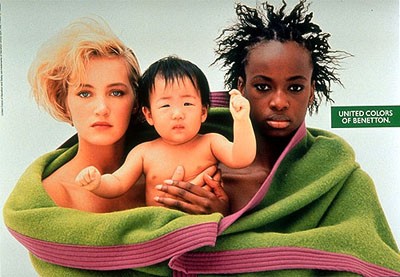
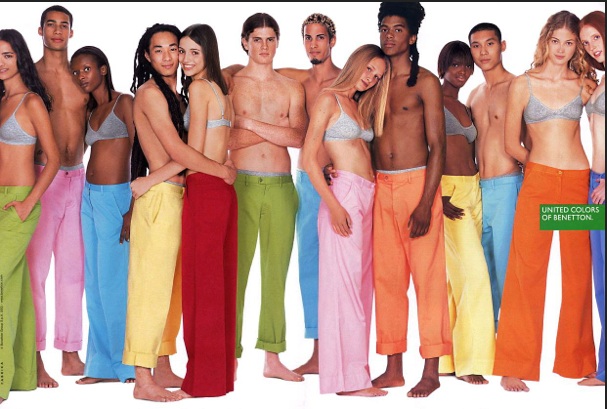
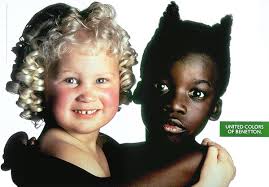

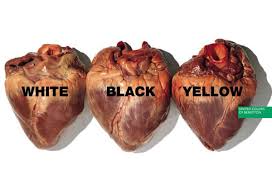
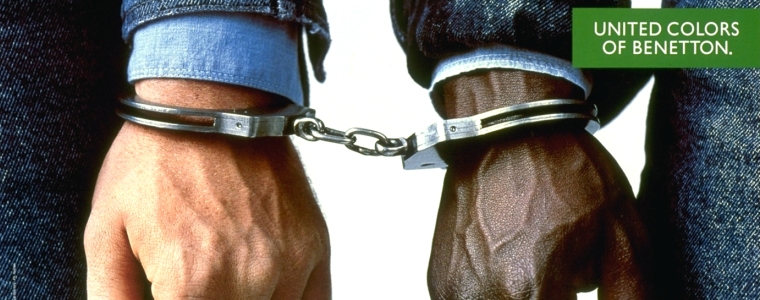
Benetton: A History of Shocking Ad Campaigns
I just jumped in PhyllidaDavenport - I'm sure someone has probably already mentioned these - but it was the first thing I thought of when I was looking through the H&M photos
I love this sort of thing - excellent topic
Edit to add one more :-)
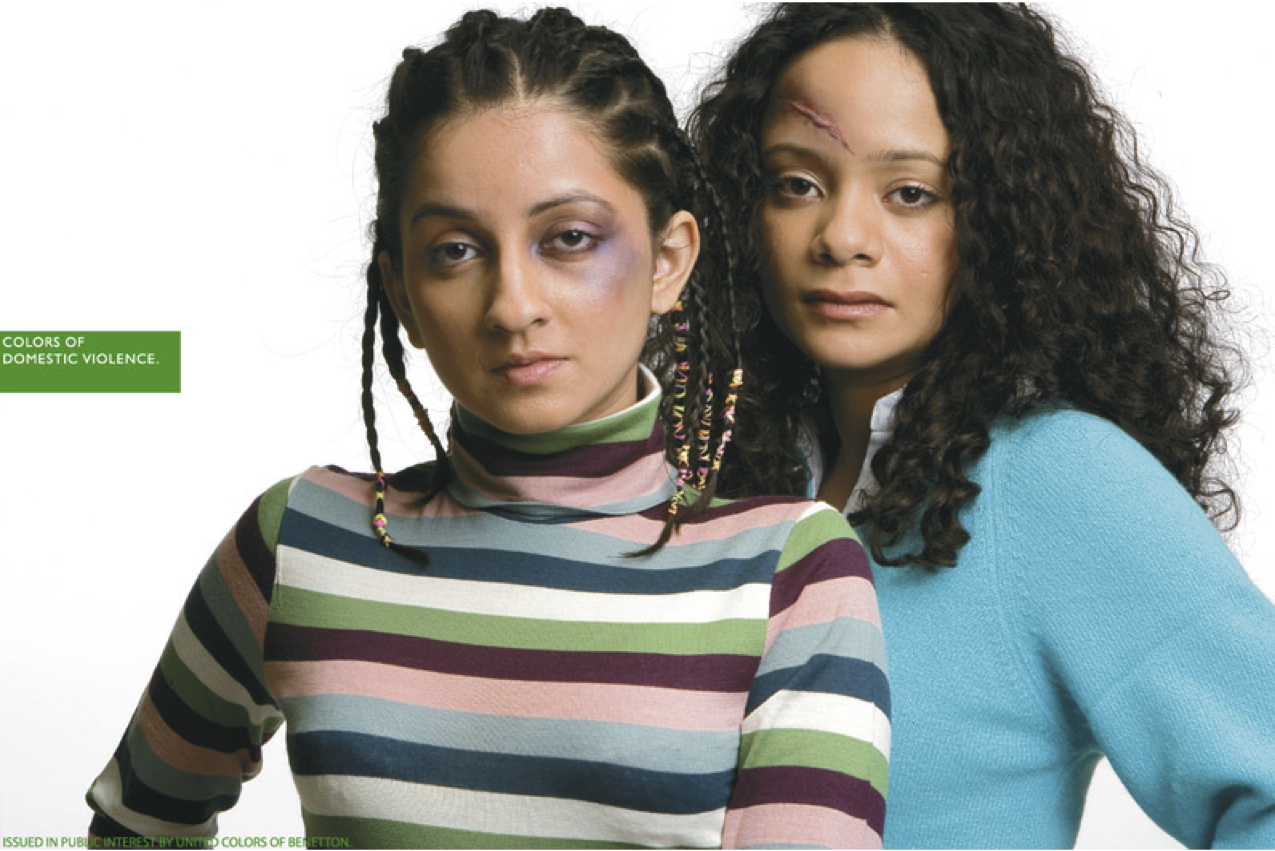
Squirm baby squirm. I think its a fair question - can you market a product and still be honestly provocative - or is it dishonest?
Are H&M just jumping on the pc bandwagon?
Would it be more politically correct to exclude people - or to include them? I think it's only a bandwagon if you view it as a gimmick. Tee world is mixing now - most people accept this. Not everyone is white, or tall, or thin, or beautiful - or...
I swear - I love these campaigns - when they're tame and beautiful - and when they out and out make people feel uncomfortable






Benetton: A History of Shocking Ad Campaigns
I just jumped in PhyllidaDavenport - I'm sure someone has probably already mentioned these - but it was the first thing I thought of when I was looking through the H&M photos
I love this sort of thing - excellent topic
Edit to add one more :-)

Squirm baby squirm. I think its a fair question - can you market a product and still be honestly provocative - or is it dishonest?
edit on 9/29/2015 by Spiramirabilis because: (no reason given)
a reply to: Spiramirabilis
Thanks
Advertising as we know is basically part dishonesty and part psychology. Benetton have been at it for years and it was their trademark hence the United Colours of Benetton. not bandwagon jumping, not fashionably cutting edge just plain we don't care what colour you are we love you all and here wear our clothes However that all changed in the late 90's when the Benetton family gave carte blanche to photographer Olivero Toscani (I think his name was) who went seriously ape and changed the Benetton meme with his outlandish and totally off the wall adverts unrelated to anything the company was actually selling. Again despite Benettons Environmental Tree Hugging Love Everyone public face, the truth is they like H & M still used cheap Chinese and Indian labour, considered putting miniature tracking devices in clothing to keep tabs on inventory and in 2013 when the Rana Plaza Building in Bangladesh collapsed resulting in the deaths of over 1000 people, Benetton refused to pay compensation to the survivors Trust Fund.
So all in all the Corporate identity and the public image are not quite the same and Benetton basically took the moral high ground, clearly what H & M are now trying to do
Thanks
Advertising as we know is basically part dishonesty and part psychology. Benetton have been at it for years and it was their trademark hence the United Colours of Benetton. not bandwagon jumping, not fashionably cutting edge just plain we don't care what colour you are we love you all and here wear our clothes However that all changed in the late 90's when the Benetton family gave carte blanche to photographer Olivero Toscani (I think his name was) who went seriously ape and changed the Benetton meme with his outlandish and totally off the wall adverts unrelated to anything the company was actually selling. Again despite Benettons Environmental Tree Hugging Love Everyone public face, the truth is they like H & M still used cheap Chinese and Indian labour, considered putting miniature tracking devices in clothing to keep tabs on inventory and in 2013 when the Rana Plaza Building in Bangladesh collapsed resulting in the deaths of over 1000 people, Benetton refused to pay compensation to the survivors Trust Fund.
So all in all the Corporate identity and the public image are not quite the same and Benetton basically took the moral high ground, clearly what H & M are now trying to do
a reply to: PhyllidaDavenport
Maybe they decided to step it up a notch
As I was saying last post - it's an interesting discussion. Can corporations be political, even moralizing - and then still ethically make a profit from that socially aware, button pushing political advertising? While they are challenging us to see things from a specific point of view - are we not responsible for our own thinking - and where we spend our dollars?
Here in America plenty of people put the Christian fish symbol in their advertising - to let other people know who they are and what they stand for. Is that different?
Political correctness is a term that gets bandied about quite a bit lately - if advertising is using it - even if they aren't sincere - they are using it for a reason. Their target audience values what they're trying to sell them - those ideas matter
I'd like to believe that they are sincere. I hope to have a functional, profitable business of my own one day - and I can tell you this - I mean for it to make a statement and contribute positively to some things that matter to me - first and foremost the environment. I can't be the only one that feels this way
This is the one area where I think most of us can agree - but it's troubling. This laptop I'm writing on right now was made with cheap - if not nearly slave - labor
My clothes - the same. If I buy a clock, shoes, paper - the food I eat... We are nothing but consumers
People wonder why there are unions - is it a mystery then why some people hate them?
I see the ads you've shown us as something beautiful - and even important. The products themselves are troubling - just as you point out
So - what do we do about it?
:-)
Advertising as we know is basically part dishonesty and part psychology. Benetton have been at it for years and it was their trademark hence the United Colours of Benetton. not bandwagon jumping, not fashionably cutting edge just plain we don't care what colour you are we love you all and here wear our clothes
However that all changed in the late 90's when the Benetton family gave carte blanche to photographer Olivero Toscani (I think his name was) who went seriously ape and changed the Benetton meme with his outlandish and totally off the wall adverts unrelated to anything the company was actually selling.
Maybe they decided to step it up a notch
As I was saying last post - it's an interesting discussion. Can corporations be political, even moralizing - and then still ethically make a profit from that socially aware, button pushing political advertising? While they are challenging us to see things from a specific point of view - are we not responsible for our own thinking - and where we spend our dollars?
Here in America plenty of people put the Christian fish symbol in their advertising - to let other people know who they are and what they stand for. Is that different?
Political correctness is a term that gets bandied about quite a bit lately - if advertising is using it - even if they aren't sincere - they are using it for a reason. Their target audience values what they're trying to sell them - those ideas matter
I'd like to believe that they are sincere. I hope to have a functional, profitable business of my own one day - and I can tell you this - I mean for it to make a statement and contribute positively to some things that matter to me - first and foremost the environment. I can't be the only one that feels this way
the truth is they like H & M still used cheap Chinese and Indian labour, considered putting miniature tracking devices in clothing to keep tabs on inventory and in 2013 when the Rana Plaza Building in Bangladesh collapsed resulting in the deaths of over 1000 people, Benetton refused to pay compensation to the survivors Trust Fund.
This is the one area where I think most of us can agree - but it's troubling. This laptop I'm writing on right now was made with cheap - if not nearly slave - labor
My clothes - the same. If I buy a clock, shoes, paper - the food I eat... We are nothing but consumers
People wonder why there are unions - is it a mystery then why some people hate them?
I see the ads you've shown us as something beautiful - and even important. The products themselves are troubling - just as you point out
So - what do we do about it?
:-)
edit on 9/30/2015 by Spiramirabilis because: (no reason given)
a reply to: Spiramirabilis
I think its time to call them out on their shoddy work practices and knock them off their very high ethical & moral high horse.
If these companies are going to use workers in the east and places like that, then they should be accountable for what goes on in their factories, pay a living wage, and give the workers the same rights as they would have in any other country in the West. A lot to ask I know but how they can they and others in all honesty attempt to portray themselves as leaders in the ethical pc advertising world whilst still continuing to use slave labour?
I think its time to call them out on their shoddy work practices and knock them off their very high ethical & moral high horse.
If these companies are going to use workers in the east and places like that, then they should be accountable for what goes on in their factories, pay a living wage, and give the workers the same rights as they would have in any other country in the West. A lot to ask I know but how they can they and others in all honesty attempt to portray themselves as leaders in the ethical pc advertising world whilst still continuing to use slave labour?
a reply to: PhyllidaDavenport
I agree - but it's not that simple
From an old article:
In Praise of Cheap Labor
Which was linked from this more recent article:
Safer Sweatshops
I like Mr. Krugman - even though he doesn't actually offer a way out of this. He can't - the solution exists in a fantasy world where consumers actually put their money where their mouths are, business owners give up SOME profit, and workers are provided with humane, safe working conditions along with being paid a living wage. I think what we're looking for here maybe is an afterlife scenario - where anything is possible with God's love
He leaves the article with:
Sigh... :-) So - like I asked in the last post - what do we do? Write letters? Boycott? Occupy the lobby of H&M?
We all do nothing but consume - products. There's nothing really wrong with that - until you start to feel guilty about how you got those products. Products are wages - to someone. That's not a rationalization - that is reality
You're talking to a completely PC, bleeding heart liberal here. I have no idea what we do
Meantime - that advertising campaign is still saying something important
I think your concern for the welfare of impoverished workers is sincere - and correct. I wonder why anyone would care about what Muslim woman chooses to wear? How cool is it that maybe it might be considered beautiful - and fashionable?
Maybe someday - they'll change their minds. Until then - it's just ammunition to be used against Muslims. The whole anti-PC war only exists because people are afraid of change
Christian headcovering is the veiling of the head by women in a variety of Christian traditions. Some cover only in public worship, while others believe they should cover their heads all the time. The Biblical basis for headcoverings is found in 1 Corinthians 11:2–16.[1] Though head covering was practiced by most Christian women up until the 1960s,[2] it is now a minority practice among contemporary Christians in the West, although it remains the norm in the East.

I agree - but it's not that simple
From an old article:
In Praise of Cheap Labor
But matters are not that simple, and the moral lines are not that clear. In fact, let me make a counter-accusation: The lofty moral tone of the opponents of globalization is possible only because they have chosen not to think their position through. While fat-cat capitalists might benefit from globalization, the biggest beneficiaries are, yes, Third World workers.
Which was linked from this more recent article:
Safer Sweatshops
It remains true that given their low productivity, countries like Bangladesh can’t be competitive with advanced countries unless they pay their workers much less, and provide much worse working conditions too. The Bangladeshi apparel industry is going to consist of what we would consider sweatshops, or it won’t exist at all. And Bangladesh, in particular, really really needs its apparel industry; it’s pretty much the only thing keeping its economy afloat.
At this point, however, there really isn’t any competition between apparel production in poor countries and rich countries; the whole industry has moved to the third world. The relevant competition is instead among poor countries — Bangladesh versus China, in particular. And here the differences aren’t as dramatic: McKinsey (pdf) estimates Bangladeshi productivity in apparel at 77 percent of China’s level.
I like Mr. Krugman - even though he doesn't actually offer a way out of this. He can't - the solution exists in a fantasy world where consumers actually put their money where their mouths are, business owners give up SOME profit, and workers are provided with humane, safe working conditions along with being paid a living wage. I think what we're looking for here maybe is an afterlife scenario - where anything is possible with God's love
He leaves the article with:
So, can we act to improve the lot of workers in low-age, labor-intensive manufacturing? Yes, we can, as long as the goals are realistic and the measures appropriate in scale. And we should go ahead and do it.
Sigh... :-) So - like I asked in the last post - what do we do? Write letters? Boycott? Occupy the lobby of H&M?
We all do nothing but consume - products. There's nothing really wrong with that - until you start to feel guilty about how you got those products. Products are wages - to someone. That's not a rationalization - that is reality
You're talking to a completely PC, bleeding heart liberal here. I have no idea what we do
Meantime - that advertising campaign is still saying something important
I think your concern for the welfare of impoverished workers is sincere - and correct. I wonder why anyone would care about what Muslim woman chooses to wear? How cool is it that maybe it might be considered beautiful - and fashionable?
Maybe someday - they'll change their minds. Until then - it's just ammunition to be used against Muslims. The whole anti-PC war only exists because people are afraid of change
Christian headcovering is the veiling of the head by women in a variety of Christian traditions. Some cover only in public worship, while others believe they should cover their heads all the time. The Biblical basis for headcoverings is found in 1 Corinthians 11:2–16.[1] Though head covering was practiced by most Christian women up until the 1960s,[2] it is now a minority practice among contemporary Christians in the West, although it remains the norm in the East.

edit on 9/30/2015 by Spiramirabilis because: (no reason given)
new topics
-
President BIDEN's FBI Raided Donald Trump's Florida Home for OBAMA-NORTH KOREA Documents.
Political Conspiracies: 27 minutes ago -
Maestro Benedetto
Literature: 2 hours ago -
Is AI Better Than the Hollywood Elite?
Movies: 2 hours ago -
Las Vegas UFO Spotting Teen Traumatized by Demon Creature in Backyard
Aliens and UFOs: 5 hours ago -
2024 Pigeon Forge Rod Run - On the Strip (Video made for you)
Automotive Discussion: 6 hours ago -
Gaza Terrorists Attack US Humanitarian Pier During Construction
Middle East Issues: 6 hours ago -
The functionality of boldening and italics is clunky and no post char limit warning?
ATS Freshman's Forum: 7 hours ago -
Meadows, Giuliani Among 11 Indicted in Arizona in Latest 2020 Election Subversion Case
Mainstream News: 8 hours ago -
Massachusetts Drag Queen Leads Young Kids in Free Palestine Chant
Social Issues and Civil Unrest: 8 hours ago -
Weinstein's conviction overturned
Mainstream News: 10 hours ago
top topics
-
Krystalnacht on today's most elite Universities?
Social Issues and Civil Unrest: 11 hours ago, 9 flags -
Supreme Court Oral Arguments 4.25.2024 - Are PRESIDENTS IMMUNE From Later Being Prosecuted.
Above Politics: 11 hours ago, 8 flags -
University of Texas Instantly Shuts Down Anti Israel Protests
Education and Media: 14 hours ago, 7 flags -
Weinstein's conviction overturned
Mainstream News: 10 hours ago, 7 flags -
Gaza Terrorists Attack US Humanitarian Pier During Construction
Middle East Issues: 6 hours ago, 7 flags -
Massachusetts Drag Queen Leads Young Kids in Free Palestine Chant
Social Issues and Civil Unrest: 8 hours ago, 6 flags -
Meadows, Giuliani Among 11 Indicted in Arizona in Latest 2020 Election Subversion Case
Mainstream News: 8 hours ago, 5 flags -
Las Vegas UFO Spotting Teen Traumatized by Demon Creature in Backyard
Aliens and UFOs: 5 hours ago, 4 flags -
President BIDEN's FBI Raided Donald Trump's Florida Home for OBAMA-NORTH KOREA Documents.
Political Conspiracies: 27 minutes ago, 3 flags -
2024 Pigeon Forge Rod Run - On the Strip (Video made for you)
Automotive Discussion: 6 hours ago, 2 flags
